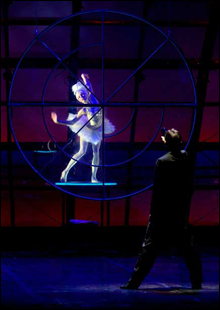
FEATHERING HER NEST: Nina gives the men what they want, whatever that is. |
The plays of Anton Chekhov don’t take well to dance: his words have a life of their own and must be translated out of Russian and into the body. Kenneth MacMillan’s Winter Dreams reduces Three Sisters to a series of frustrated-lover duets and then a duel; call it “Days of Our Chekhov Lives.” On the Elektra videotape of a 1992 Royal Ballet performance, Irek Mukhamedov, Darcey Bussell, Anthony Dowell, and Viviana Durante ghost past the birch trees like disembodied Chekhov spirits; the 2000 Boston Ballet production had more body language. (It’s never fair, of course, to compare live with video; live will always look better.) The Seagull, an adaptation of which the Eifman Ballet of St. Petersburg is presenting at the Cutler Majestic Theatre through April 1, is a deep lake of dreams and nightmares, love and betrayal, art and alcohol. It’s set on the country estate of Petr Nikolaevich Sorin and his diva actress sister, Irina Nikolaevna Arkadina. Schoolteacher Medvedenko loves hard-drinking Masha, the daughter of the estate manager; Masha loves Irina’s son, aspiring playwright Treplev; Treplev loves a neighbor girl, aspiring actress Nina; and Nina is beginning to fall for Irina’s boyfriend, the writer Trigorin. And Polina, Masha’s mother, loves Dr. Dorn, who it’s clear is Masha’s father. Aesthetic conflict is in the air: the old-fashioned art of Irina and Trigorin versus Treplev’s vision of the new. As for the title metaphor, Treplev shoots one, for no clear reason, and presents it to Nina. Betrayed by Trigorin, is she the seagull? Are we all seagulls?
Boris Eifman deep-sixes the “minor” characters, leaving us with Irina, Trigorin, Treplev, and Nina, and he’s moved the action from the estate to the ballet studio, where Trigorin is the ballet master, Irina the prima ballerina, Treplev an aspiring choreographer, and Nina an aspiring principal. It’s not really Chekhov, who has no minor characters; we lose, among other things, everyone’s self-centeredness — Medvedenko’s moaning over the hard life of a schoolteacher, Shamraev’s obsession with provincial-theater history, Irina’s vanity and stinginess, Treplev’s youthful self-righteousness, Trigorin’s treatment of everything as grist for his art. But the shift to the studio makes sense; we can’t assess writing and acting in a dance, only choreographing and dancing.
The curtain rises on Treplev (Dmitri Fisher opening night), who, wearing a sleeveless blue shirt and jeans, is trapped inside an open metal cube about three feet high — it’s a metaphor for, yes, the confines of traditional dance. Overhead arcs a light bank shaped like an airplane hatch. He distorts the cube and breaks out. Irina (Nina Zmievets) appears and starts doing tendus at the barre, ignoring his attempts to give her more modern material. We move to the studio, where Treplev is no more successful in asserting himself; Nina (Maria Abashova), meanwhile, has eyes for Trigorin (Yuri Smelakov), but he’s snagged by Irina. Treplev tries to share his innovative choreography — mostly writhing and squirming, tortured moves that suggest “The Dying Seagull” — with Nina, but she’s too traditional to pick up on it.